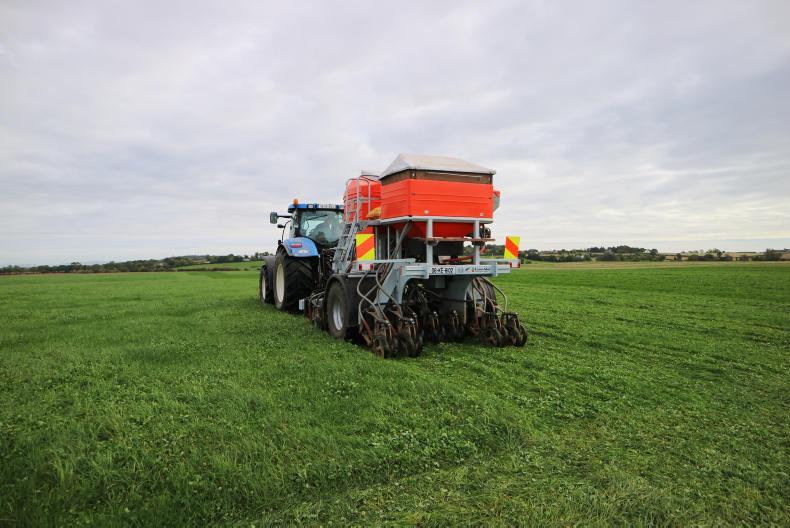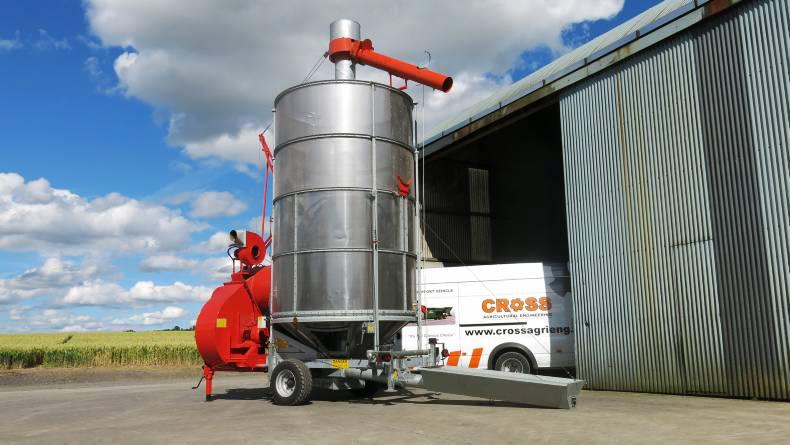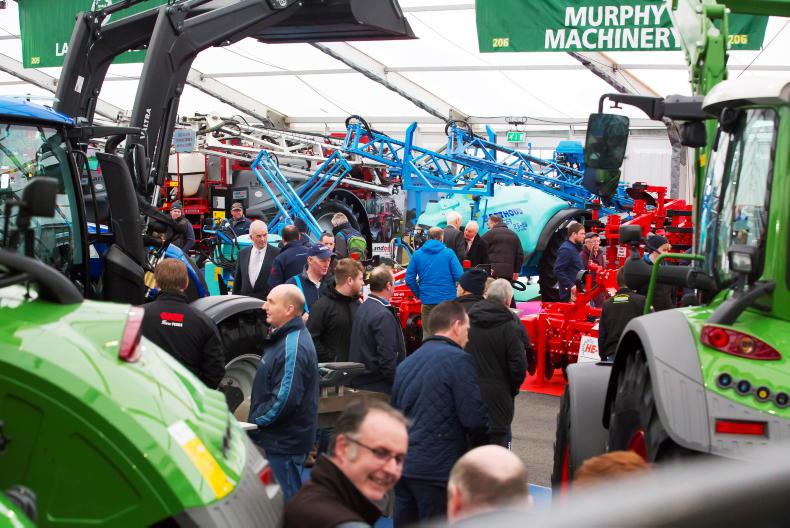Jason Cross has set up a new business this summer called Cross Grain Services. This sees Cross taking the franchise for the full range of Pedrotti grain driers for all of Ireland from Tom McHugh, who will remain working in the grain-drying business with Cross for a two-year period.
The Fratelli Pedrotti company was founded at the beginning of the 1950s. Since the end of the 1970s, it has specialised in driers. The range is now exported all over the world. From its existing base in Rathangan, a new wing is dedicated to the drying business, with €75,000 worth of parts already on the shelf to service customers’ machines.
The Pedrotti machines, or Masters dryer as they are known in the UK, are very popular in Ireland, according to Jason. Tom McHugh has been developing and maintaining the business for the last 40 years, Jason said, and he will work in conjunction with Jason to ensure a smooth changeover.
Jason believes that the new range will complement the business, as it has established a strong brand presence across its own existing ranges. Jason is committed to offering 24/7 backup during the peak harvesting times. Jason says that from a location point of view, he can be on most farms within two hours after leaving the base in Rathangan.
“Existing customers will know the backup we provide and this will be replicated in the new business,’’ says Jason.
The other facet that Cross adds is the fact that it is an engineering company. This will allow it to customise any machine installation to suit the farmer’s needs.
Augurs, bins and conveyors can all be fitted and made directly by Cross Engineering to get the best from the dryer. Secondhand machines will receive a complete overhaul and will be reoffered for sale with a guarantee. This could be a good option for farmers on a tighter budget or on a smaller scale.
The full range of Pedrotti dryers comprises 10t to 55t batch-drying machines. Jason believes that a hybrid design works best to power the units. This combines PTO power and electrical generator power.
For most farmers, it will make sense to hire a generator when the harvest is in full swing and the dryer is working continuously. As the season slows and the harvest becomes intermittent between showers, the cost of hiring the generator for idle hours is less efficient than using PTO power. The dryers have innovative touchscreen controls for convenience.
Also available is an app that allows the operator stay in control from the tablet or mobile phone. The app shows the status of the dryer at work and allows for the operator to change settings in real time. The control screen has presets for each type of crop to be dried and the number of batches to be run. Effectively this makes drying a continuous process with automatic loading and unloading of the dryer.
Benefits of drying grain
Jason highlighted that drying grain allows for the farmer to spread the price risk at harvest. Storing grain gives the farmer more sale options rather than the grain price that is available on the day at harvest, according to Jason.
Other benefits include a cleaner sample and higher bushel weights, says Jason. Tom McHugh estimates that it roughly takes one gallon or 4.5 litres of diesel to dry one tonne of grain from 20% to 14% moisture.
Tom highlights the fact that drying not fully ripe grain and green grains will increase the fuel consumption on the burners. The dryers on average will work for 5,000 hours without needing an overhaul. Good maintenance will help to reach that target, Jason adds. For the batch to achieve a 5% dry rate, regardless of the size of the machine, Tom says it will take 3.5 to four hours on average. The Pedrotti XL 550 has an output of 10t per hour at a 5 % dry rate in cereals, according to the manufacturer. That machine should in theory dry 50,000t before needing an overhaul.
Tri-axle 30t Double Chaser Bin
The unique part of this machine is that the 30t bin is divided into two storage compartments. One compartment is for seed and the other section for fertiliser. The dual discharge augers emerging at centre of the bin allows a drill to be filled with seed and fertiliser.
According to Simon Cross, this will eliminate having to bag seed and fertiliser for sowing as it can be stored in the chaser bin. It also eliminates the need for a loader to follow the drill around. That should be attractive for tillage farmers with a fragmented farm.
It seems that Cross is adding value to the machine by giving it a longer working cycle in the year both at harvest and drilling time. The company has sold two in Ireland to date, with big interest from farmers in the UK and Europe.
Read more
Special focus: FTMTA Farm Machinery Show
Jason Cross has set up a new business this summer called Cross Grain Services. This sees Cross taking the franchise for the full range of Pedrotti grain driers for all of Ireland from Tom McHugh, who will remain working in the grain-drying business with Cross for a two-year period.
The Fratelli Pedrotti company was founded at the beginning of the 1950s. Since the end of the 1970s, it has specialised in driers. The range is now exported all over the world. From its existing base in Rathangan, a new wing is dedicated to the drying business, with €75,000 worth of parts already on the shelf to service customers’ machines.
The Pedrotti machines, or Masters dryer as they are known in the UK, are very popular in Ireland, according to Jason. Tom McHugh has been developing and maintaining the business for the last 40 years, Jason said, and he will work in conjunction with Jason to ensure a smooth changeover.
Jason believes that the new range will complement the business, as it has established a strong brand presence across its own existing ranges. Jason is committed to offering 24/7 backup during the peak harvesting times. Jason says that from a location point of view, he can be on most farms within two hours after leaving the base in Rathangan.
“Existing customers will know the backup we provide and this will be replicated in the new business,’’ says Jason.
The other facet that Cross adds is the fact that it is an engineering company. This will allow it to customise any machine installation to suit the farmer’s needs.
Augurs, bins and conveyors can all be fitted and made directly by Cross Engineering to get the best from the dryer. Secondhand machines will receive a complete overhaul and will be reoffered for sale with a guarantee. This could be a good option for farmers on a tighter budget or on a smaller scale.
The full range of Pedrotti dryers comprises 10t to 55t batch-drying machines. Jason believes that a hybrid design works best to power the units. This combines PTO power and electrical generator power.
For most farmers, it will make sense to hire a generator when the harvest is in full swing and the dryer is working continuously. As the season slows and the harvest becomes intermittent between showers, the cost of hiring the generator for idle hours is less efficient than using PTO power. The dryers have innovative touchscreen controls for convenience.
Also available is an app that allows the operator stay in control from the tablet or mobile phone. The app shows the status of the dryer at work and allows for the operator to change settings in real time. The control screen has presets for each type of crop to be dried and the number of batches to be run. Effectively this makes drying a continuous process with automatic loading and unloading of the dryer.
Benefits of drying grain
Jason highlighted that drying grain allows for the farmer to spread the price risk at harvest. Storing grain gives the farmer more sale options rather than the grain price that is available on the day at harvest, according to Jason.
Other benefits include a cleaner sample and higher bushel weights, says Jason. Tom McHugh estimates that it roughly takes one gallon or 4.5 litres of diesel to dry one tonne of grain from 20% to 14% moisture.
Tom highlights the fact that drying not fully ripe grain and green grains will increase the fuel consumption on the burners. The dryers on average will work for 5,000 hours without needing an overhaul. Good maintenance will help to reach that target, Jason adds. For the batch to achieve a 5% dry rate, regardless of the size of the machine, Tom says it will take 3.5 to four hours on average. The Pedrotti XL 550 has an output of 10t per hour at a 5 % dry rate in cereals, according to the manufacturer. That machine should in theory dry 50,000t before needing an overhaul.
Tri-axle 30t Double Chaser Bin
The unique part of this machine is that the 30t bin is divided into two storage compartments. One compartment is for seed and the other section for fertiliser. The dual discharge augers emerging at centre of the bin allows a drill to be filled with seed and fertiliser.
According to Simon Cross, this will eliminate having to bag seed and fertiliser for sowing as it can be stored in the chaser bin. It also eliminates the need for a loader to follow the drill around. That should be attractive for tillage farmers with a fragmented farm.
It seems that Cross is adding value to the machine by giving it a longer working cycle in the year both at harvest and drilling time. The company has sold two in Ireland to date, with big interest from farmers in the UK and Europe.
Read more
Special focus: FTMTA Farm Machinery Show










SHARING OPTIONS